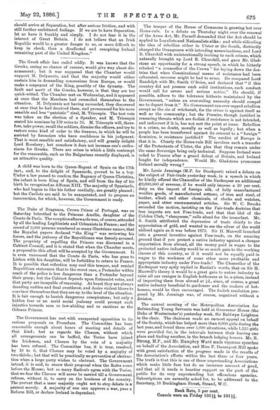The temper of the House of Commons is growing hot
over Home-rule. In a debate on Thursday night over the renewal of the Arms Act, Mr. Parnell demanded that the Act should be applied to Loyalists and Nationalists alike; and while ridiculing the idea of rebellion either in Ulster or the South, distinctly charged the Orangemen with intending assassinations, and Lord
R. Churchill with unintentionally inciting to such crimes, which naturally brought up Lord R. Churchill, and gave Mr. Glad- stone an opportunity for a strong speech, in which he bitterly rebuked "a counsellor of the Crown" for laying down the doc- trine that when Constitutional means of resistance had been exhausted, recourse might be had to arms. He compared Lord Randolph with Mr. Smith O'Brien, and declared that "if this country did not possess such solid institutions, such conduct would call for severe and serious notice." He should, if possible, adhere to the tolerance hitherto maintained by the Government, "unless an over-ruling necessity should compel me to depart from it." No Government can ever regard rebellion except as the sin of witchcraft, for the crime is against itself as well as the community ; but the Premier, though justified in censuring threats which are foolish if resistance is not intended, and indiscreet if it is, has not met the point at issue. Rebellion is a crime, no doubt, morally as well as legally ; but when a people has been transferred against its consent to a " foreign " dominion, is resistance justified P The verdict of Europe is that it is. Clearly the Home-rule Bill involves such a transfer of the Protestants of Ulster, the plea that they remain under the same Sovereign being only technical. Suppose Ireland were ceded to France after a grand defeat of Britain, and Ireland fought for independence. Would Mr. Gladstone pronounce Ireland morally wrong P


































 Previous page
Previous page